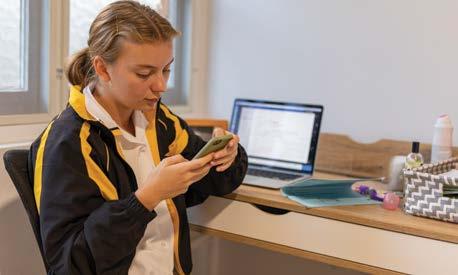
4 minute read
Overcoming back-to-school blues
For most students across Australia, the 2023 school year has kicked off and classes, sport and other activities are in full swing. To help high school students handle the challenges and changes ahead, Salvos Magazine writer Anthony Castle spoke to John Marion, Youth and Young Adults Specialist for The Salvation Army Australia.
Anthony Castle: For many, the new school year is like returning to something they know. For others, it’s completely new. What kind of thoughts and feelings might they be experiencing?
Advertisement
John Marion: Going back to school can bring up so many emotions. you might be excited about seeing your friends, the opportunity to try new subjects, or to find out who is in your classes. you might feel a confidence boost as you move up a year, become more senior in the school and are more familiar with how everything works. you might even feel relief to be back at school and in an environment where you have people who care about you.
But school can also be difficult or challenging. you might feel anxiety at the thought of seeing people who make you feel uncomfortable or pick on you. Maybe the pressures and expectations to do well or achieve good grades make you feel like giving up. Sometimes you might even feel alone – that you are surrounded by so many people, but no one is there for you to rely on.
It can be helpful to remember that everyone will have differing emotions about going back to school, so you’re not alone. When we talk about how we are feeling we can start to prepare for what we can do about these feelings.
What do we do with what we’re feeling?
Sometimes it can be a struggle to know what feelings mean and what you can do about them. It can be helpful to first take some time to recognise all the emotions you are experiencing and to remember that no emotion is bad.
When you have noted your emotions, you can work out if you need support or what you might need help with. Maybe you’re feeling anxious about being in large crowds with people you don’t know, because you’re worried that you’ll feel alone. When you realise this, you can work out what can help you feel more confident. you could make sure that you walk into school with a friend or have a place where you can meet so you feel supported.
It can also be difficult to know what you are feeling sometimes, making it a challenge to plan and prepare for the year ahead. When you are struggling to understand your emotions, it can be helpful to talk to people you trust and who can support you. you might have supportive friends who are good listeners, or carers, teachers or chaplains you can talk to. Perhaps going to a professional service like headspace or a school counsellor is what you need.
Reaching out if you are struggling can help you start the year feeling your best. What are some of the risks, and opportunities, in returning to school?
The new school year brings with it so many opportunities. you get to try new subjects, make new friends and learn new things. This can be an exciting time where you explore who you are and what makes you happy. you can start to think about what careers might interest you when you leave school, experiences you want to have and people you want to be with.
But the new school year can also be challenging. If you find the start of the year difficult you might want to give up, disengage and disconnect. you might push away friends and teachers, stop trying in class and miss opportunities to try new things. If the school year doesn’t start off as you expected or wanted it to, it can be hard to get back on track.
It’s important to know that, just because the school year might not start well, it can still get better. If you begin to struggle you can look to friends, teachers, counsellors and chaplains for support to help you get back on track.
What are a few things we can do to organise the supports we need?
1.
Mental preparation
Thinking through what you need or want for your first weeks back at school can help you work out what support you might need. you could work out a time and place to meet friends, look over your timetable and school map so you know where you need to go, or have your school uniform ready for when you wake up. If you go over the day in your head, you can form a plan to make your weeks easier and feel prepared.

2. Get into a good sleeping pattern
It can be helpful to get into a rhythm of eight to nine hours of sleep each night before school starts and continue that routine. Being rested and adjusted to the routine can help you feel prepared.
3. Identify support
Being aware of the people you can go to for support can help you feel confident in knowing what to do if school starts to feel difficult. It’s the same with resources such as mindfulness apps, phone lines you can call and programs or groups you may be able to attend.
Knowing what supports you have before you need them can help you feel prepared if or when you do want help, and make the process easier.
Helpful Resources
Helplines
Lifeline – Call 13 11 14 for crisis support and counselling, with a focus on suicide prevention.
Kids Helpline – Call 1800 55 1800 for free, private and confidential phone and online counselling services for young people aged five to 25.
Mindfulness apps
Smiling Mind headspace: meditate and relax
Programs or groups
Visit headspace.org.au to see what your local centre offers and for information about mental health and wellbeing.
Check out your local Salvation Army church or youth group.
Scan here for more on mental health.



